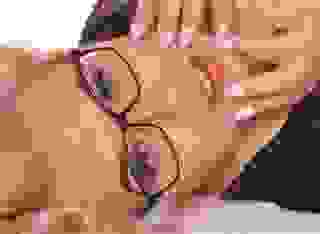- Reviews & Essays
- The Mute Speak
Note: You can change font size, font face, and turn on dark mode by clicking the "A" icon tab in the Story Info Box.
You can temporarily switch back to a Classic Literotica® experience during our ongoing public Beta testing. Please consider leaving feedback on issues you experience or suggest improvements.
Click hereQuite often in popular fiction we meet a character who is able-bodied and who can hear but are mute. It is vital to note at the outset that "mute" in this context means lack of language rather than lack of vocalization. Sign languages are just as valid as spoken ones and the Deaf Community is a very proud, accomplished, and articulate group. Indeed, many Deaf people do not even consider themselves "disabled," but members of a linguistic minority.
However, our fictional, hearing mutes do not know Sign or another non-vocal communication system and thus truly lack language--though they understand it.
What do these uncommunicative characters represent? One answer to this question is sexist. Observed Yvette Mimiex, an actress who played such a part: "It's probably a male fantasy, a woman who can't talk."
But male fictional (hearing) mutes also appear, usually in horror tales. Irrespective of gender, they are spooky, these strangely silent people. What have they seen? Will they break through that barrier of silence to release--what? What secrets are they keeping?
The three books discussed in this essay answer these questions. Unlike their mysterious fictional counterparts, each of these mute authors is physically disabled. Also unlike them, they tell their secrets.
Stephen Hawking grew up able-bodied and speaking. Always fascinated by the basic workings of the universe, he was at Cambridge working at a Ph.D in cosmology when he began having increasing problems with his coordination. He was diagnosed as having motor neuron disease, commonly called Lou Gehrig's disease, and told her probably had only two or three years to live.
Understandably depressed, he wrote in an online article called "Disability -- My Experience with ALS," that he "felt somewhat of a tragic character" and suffered disturbing dreams but adds that, "reports in magazine article that I drank heavily are an exaggeration."
Nevertheless, he started progressing in his research, got engaged to Jane Wilde, and applied for and received a research fellowship.
Hawking notes in that same article that, "I was lucky to have chosen to work in theoretical physics, because that was one of the few areas in which my condition would not be a serious handicap."
In 1970, Hawking, together with Roger Penrose, he published a paper that made scientific history. As Hawking wrote in A Brief History of Time, they "proved that there must have been a big bang singularity provided only that general relativity is correct and the universe contains as much matter as we observe." The "big bang singularity" means a definite starting point for the universe
In the years that followed, Hawking's body deteriorated while he did landmark work in physics. Much of it was on the subject of black holes, former stars that have contracted inward to points in which gravity is so strong that not even light can escape. According to the Wikpedia encyclopedia entry on Hawking, "He showed that the surface area of a black hole can increase but never decrease, that there is a limit on the radiation emitted when black holes collide, and that a single black hole cannot break apart into two separate black holes. In 1974, he calculated that black holes thermally create and emit subatomic particles until they exhaust their energy and explode. Known as Hawking radiation, it linked gravity, quantum mechanics, and thermodynamics mathematically for the first time."
Hawking caught pneumonia in 1985 and that necessitated a tracheostomy that removed his ability to speak but not his ability to "talk" in the fullest sense of that word. With the help of a laptop computer, the scientist uses one finger to tap out his thoughts. His "clicker" can also be activated by head or eye movement so it is likely he will continue to communicate as long as he is alive and conscious. His words appear on a screen and can be heard through a vocal synthesizer. Through this process Hawking has lectured widely, written many complex scientific papers as well as works for popular consumption like A Brief History of Time, The Universe in a Nutshell and Black Holes and Baby Universes and Other Essays.
While Hawking's achievements would have brought him fame in any case, his disability ensures that his photograph appears in any article about him. The great physicist in his wheelchair, muscles dramatically wasted, seems to personify what The Economist called "the universe in a nutshell" (perhaps this served as inspiration for the title of his book). Unfortunately, writings about him often use unnecessarily negative terms about his disability. A Time magazine article quoted on the back of A Brief History of Time's dust jacket describes him as "helpless in his wheelchair." The inside of that same jacket says he is "trapped by Lou Gehrig's disease."
These needlessly disempowering terms are especially unthinking because the truth is that the very vastness of this scientist's quest means that, as he states in the acknowledgments to A Brief History of Time, "my disability has not been a serious handicap" since theoretical physics is "all in the mind." Furthermore, Hawking leads an active life. He travels widely and once made a guest appearance on the TV show Star Trek: The Next Generation in which he played poker with Data, Albert Einstein, and Isaac Newton. Perhaps a tribute to his special fame is that he is the only person to have ever appeared on that program as himself.
Christopher Nolan's silence is the most ironic of the three figures examined here since he is a literary genius. Nolan has had a severe case of cerebral palsy since birth and had never spoken -- or Signed -- a word in his life; yet his poetry has been compared to that of Joyce, Keats, and Yeats. The drug Lioresal has given him a minimal degree of muscular control in his neck so that he can hit the keys on a typewriter by means of a stick affixed to his head. Through this "unicorn" Nolan wrote the poems, short stories, and plays collected in Dam-Burst of Dreams, his autobiography, Under the Eye of the Clock and a novel called The Banyon Tree.
Like Christopher Nolan, Ruth Sienkiewicz-Mercer has cerebral palsy but, unlike him, she lacks even minimal muscular control. As the title of her autobiography indicates, she says "yes" by raising her eyes; she also says "no" by lowering them, and "maybe" with a curled lip.
She "talks" through "word boards"--laminated pieces of white cardboard, on which words, phrases, and numbers are arranged in rows and columns. The person with whom she communicates points to a row to ask if a word she wants to say is there; she answers with her eyes. Then the two must go through columns and rows together until they get to the word she picks. Thus, she conveys thoughts and experiences but cannot give us the specific rhythm and pattern of her thoughts. Unlike Hawking and Nolan, she must have a co-author.
Why now? one wonders. Why is our age one in which so many of the "mute" are talking? The answer is twofold, both scientific and cultural. Christopher Nolan's Lioresel and Stephen Hawking's computerized voice synthesizer are blessings of modern science. (A striking irony: a voice synthesizer is also used by Koko the Signing gorilla!)
The political and social upheavals of the last decades, beginning with the Civil Rights movement of the '60s and continuing through the more recent activism of disabled groups, have opened our ears to the previously silenced. We hear because we listen.
Indeed, in the case of Ruth Sienkiewicz-Mercer, the cultural milieu may deserve total credit, as she has benefited from no drug or technological device.
These books teach us much about our common humanity. People are different, but far more alike than different. Sienkiewicz-Mercer opens her chapter on the Belchertown Institution with a sentiment common to institutional residents everywhere, whether college students, hospital patients, or jail inmates: FOOD. LIKE. SHIT.
Christopher Nolan revels in everyday life. His joyous memory of his mother fixing a turkey for Christmas could be anyone's--though only he could describe it in such an arresting manner. "Wielding a sharp knife Nora cut off the lonesome, guilty-looking head, then she cut off the scaled-skin legs. Next she slit the turkey open and forced the flesh to yield. She eased her hand up into the cavern. A huge gllomp sighed from the depths within. She began to pull. . . . At last she pulled the innards outward. Another resurrecting plurpp issued with the tissue. She left her booty upon the newspapers. . . . He could see her fingers bothering the breast skin. Then they ripped out the crop. It looked like a burst balloon and was inclined to twist around her fingers."
Our mutes give a fresh insight into the cliché that, "I'd give anything to have been a fly on the wall when . . ." But there was always a fly on the wall, and the fly was more concerned about the tasty excrement it was eating than the human disaster occurring nearby. What we really mean, of course, is "I'd give anything to have been present and invisible."
People who are severely retarded are frequently perceived as invisible. So are those mistaken for such--like Ruth Sienkiewicz-Mercer. Unfortunately, the insights she received through her "fly-on-the-wall" status were often depressing. She writes: "You can tell an awful lot about a person from how she picks you up or feeds you as well as from what she says about people behind their backs when she doesn't suspect you're listening and comprehending. . . . [The attendants] talked disparagingly about me right to my face, as if I couldn't understand a word they were saying."
Thanks to his computer and voice synthesizer, Stephen Hawking has never stopped talking so he never went through the frustration that Christopher Nolan and Ruth Sienkiwicz-Mercer did when they were unable to get their thoughts out.
Nolan writes that when he was three years old he wept with frustration and self-pity at his condition "once, once only." Look at how sensitive his mother was to her speechless son's thoughts and feelings.
Nora serenely simpered as she lifted him. Washed and powdered he sat on her lap. Fondly she slipped the geansai over his blonde head. His head tilted boldly forward then suddenly it shot backwards. He faced his mother. He gazed his hurt gaze, lip protruding, eyes busy in conversation. He ordered her to look out the window at the sunshine. He looked hard at her ear ordering her to listen to the birds singing. Then jumping on her knees he again asked her to cock her ear and listen to the village children out at play in the school yard. Now he jeered himself. He showed her his arms, his legs, his useless body. Beckoning his tears he shook his head. Looking at his mother he blamed her, he damned her, he mouthed his cantankerous why, why, why me? Distracted by his youthful harshness of realization she tried to distract him. Lifting him in her arms she brought him outside into the farmyard. 'Come on till I show you the calves,' she coaxed. His lonely tears rushed even faster. He knew why she tried to divert his boyish questioning. He childishly determined not to look at the calves and shaking his head he gazed the other way. His mother tried again. 'Look over at the lambs,' she said, pointing at the sheep feeding at their trough in the field. He cried so loud he brought her to her senses. 'Alright,' she said, 'we'll go back inside and talk.' Placing him in his chair she then sat down and faced her erstwhile boy, yes, her golden-haired accuser. Meanwhile he cried continuously, conning himself that he had beaten her to silence. Looking through his tears he saw her as she bent low in order to look into his eyes. 'I never prayed for you to be born crippled,' she said. 'I wanted you to be full of life, able to run and jump and talk just like Yvonne. But you are you, you are Joseph not Yvonne. Listen here Joseph, you can see, you can hear, you can think, you can understand everything you hear, you like your food, you like nice clothes, you are loved by me and Dad. We love you just as you are.' Pussing still, snivelling still, he was listening to his mother's voice. She spoke sort of matter-of-factly but he blubbered moaning sounds. His mother said her say and that was that. She got on with her work while he got on with his crying.
The decision arrived at that day was burnt forever in his mind. He was only three years in age but he was now fanning the only spark he saw, his being alive and more immediate, his being wanted just as he was.
Dread-filled fretting marked Joseph Meehan's scene that day, but that scene and that day looked out through his eyes for the rest of his life. Comfort came in child-like notions, his clumsy body was his, but molested by mother-love he looked lollying looks at his limbs and liked Joseph Meehan.
This emotional communication technique between Joseph and his mother, limited to "eyes busy in conversation," has a parallel in a similar process worked out by Ruth Sienkiewicz-Mercer and another patient.
Suddenly a remarkable spark passed between us, something that no one watching us would have been able to perceive . . . a riveting, deeply moving flash of complete understanding . . .
Our souls embraced. Our eyes locked for several exhilarating, magnetic, timeless moments. Then Theresa turned her head and nudged the yellow teddy bear lying beside her pillow. Making quiet, gentle sounds, Theresa repeated this gesture several times until she was certain I understood. By indicating her teddy, the only object of affection around her, she was telling me that she liked me very much, that she was beginning to develop a profound understanding of me.
. . . I responded with loving sounds of my own, and raised my eyes in an emphatic "Yes!" to make sure Theresa understood that I felt the same way about her. At that instant Theresa figured out what none of the staff would decipher for several years: that I raised my eyes to say yes.
From that moment on, Theresa and I were close friends. We took advantage of every occurrence on the ward--movements, feeding, changings, noises, outbursts, periods of total boredom--to exchange glances, facial expressions, and sounds. In this way we developed our own special language, evolving it slowly over a period of three or four months [and] we were able to fashion a basic, yet effective, system of communication.
. . . We became attuned to every change of tone and pitch in each other's repertoire of sounds, familiarizing ourselves with what each sound meant in terms of emotion, opinion, or thought. To demonstrate the significance of our expressions, we studied each other's face while repeating our sounds over and over.
Christopher Nolan's UEC and Ruth Sienkiewicz-Mercer's IRMETSY both record breakthrough experiences reminiscent of Helen Keller's justly celebrated "water" scene. However, there is a significant difference between them. The untutored Helen Keller did not understand language. By contrast, Nolan comprehended language at the usual age, as did Sienkiewicz-Mercer.
Thus, the communicative breakthroughs in their books do not record others' thoughts getting "in" to them, but Nolan and Sienkiewicz-Mercer getting their thoughts "out" to others. Nolan's description follows.
Breathing a little easier, his body a little less trembling, he sat head cupped in Eva's hands . . . Perhaps it won't happen for me today he teased himself but he was wrong, desperately, delightfully wrong. Sweetness of certainty sugared his now. Yes, he could type. He could freely hit the keys and he looked in the mirror and met her eyes. . . .
[Eva asked his mother to watch a typing lesson.] Nora waited, her son's chin cupped in her hands. Then he stretched and brought his pointer down and typed the letter 'e'. Swinging his pointer to the right he then typed another letter, and another one and another. Eva finished speaking on the telephone and Nora, while still cupping Joseph's chin turned and said, 'Eva, I know what you're talking about--Joseph is going for the keys himself--I could actually feel him stretching for them.' Eva brought [her fist] down with a bang on the table. 'So I was right, I was afraid to say anything, I had to be sure," she said as she broadly smiled.
Joseph sat looking at his women saviors. They chatted about their discovery while he nodded in happy unbelievable bewilderment. He felt himself float reliably on gossamer wings. He hungered no more.
Ruth Sienkiewicz-Mercer's liberation came like this:
"During lunch one day in early December 1965, Wessie said something to me like 'Too bad the food at this place is so lousy.'
I laughed, and raised my eyes toward the ceiling in an exaggerated way to draw her attention.
As she bought the next spoonful of food up to my mouth, she noticed that I was doing something funny with my eyes, obviously in reaction to what she had just said. I kept looking up at the ceiling, but Wessie couldn't figure out why I was doing that. She put the spoon down and thought for a few seconds, then asked, 'Ruthie, are you trying to tell me something?'
With a broad grin on my face, I looked at her squarely. Then I raised my eyes up to the ceiling again with such exaggeration that I thought my eyes would pop up through the top of my head.
Wessie knew she was onto something, but she wasn't sure just what. She pondered for a few more seconds . . . then it clicked! A silent conversation flashed between us as loud and clear as any spoken words. Even before she asked me a dozen times over, and before I exuberantly answered a dozen times with my eyes raised skyward, Wessie knew. And I knew that she knew.
I was raising my eyes to say yes.
We both started laughing. Then I started laughing really hard, and before I knew it I was crying so uncontrollably that I couldn't see because of the tears. They were tears of pure joy, the kind of tears a person sheds on being released from prison after serving three years of what she had feared would be a life sentence."
A common reaction to the stories of people like Nolan, Hawking, and Sienkiwicz-Mercer is that they "prove that if you really want to do something, you'll find a way to do it." Such "super-cripples" are often cited as support for the quintessentially American view that each individual is completely responsible for what s/he does with his or her life.
But this is a misguided reading of such people's lives.
Stephen Hawking, for all his brilliant scientific achievements, is not an inventor. Had he been born before the computer era, most of his brilliance would probably have been lost. Similarly, Christopher Nolan did not discover the drug Lioserel. Nor did he invent the typewriter. Without these things, his poems and stories might have never been written. Ruth speaks to us because someone around her was alert enough to pay attention to her laugh and sensitive enough to realize its importance.
Hawking, Nolan, and Sienckiewicz-Mercer benefit from the insights, discoveries, patience, and inventions of countless other people: those near and dear to them and complete strangers; the living and the long-dead; people acting altruistically and those just trying to earn a living.
In turn, by utilizing the opportunities made available to them, these disabled yet wonderfully able people have vastly enriched the storehouse of human knowledge and provided inspiration for all of us. The true lesson which the mute speak is that of human interdependency.
*
This essay was published in "Breath and Shadow" and an earlier version was published in "The Humanist."
- COMMENTS








